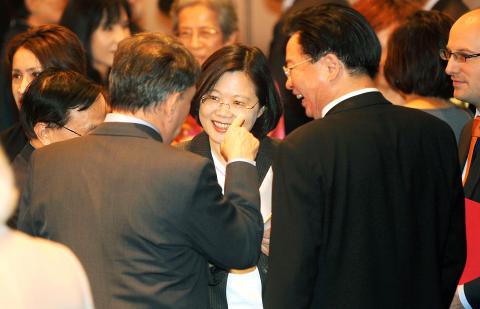The US reassured the Democratic Progressive Party (DPP) of its neutrality in January’s presidential election with an unusual diplomatic gesture yesterday, former representative to the US Joseph Wu (吳釗燮) said.
The American Institute in Taiwan (AIT) sent an unprecedented five officials, including AIT Director William Stanton, to the DPP’s 25th anniversary reception, Wu told reporters on the sidelines of the celebration at the W Hotel in Taipei’s Xinyi District (信義).
The move represented the US’ respect for the DPP, Wu said, adding that he had never seen more than two US officials at similar events.

Photo: Lin Cheng-kung, Taipei Times
It appeared as though the US was trying to “balance out” the negative impact caused by a Sept. 15 article by London’s Financial Times which was seen as an attempt to influence the election in favor of President Ma Ying-jeou (馬英九), he said.
The article quoted an unnamed Washington official — believed to be National Security Adviser Tom Donilon — as saying that DPP Chairperson Tsai Ing-wen (蔡英文) had left US President Barack Obama’s administration with “distinct concerns” about her ability to maintain stability in the Taiwan Strait.
The US would like to reassure the DPP, as well as the people of Taiwan, that it would remain neutral on Taiwan’s elections, Wu said.
Stanton was seen standing near the press area and facing the cameras, which was unusual.
“[Stanton] never mentioned anything about the Financial Times, but I guess he and his colleagues wanted to make their presence felt and make sure it was picked up by the media,” Wu said.
In her speech at the reception, Tsai recounted the party’s 25-year history and pledged to diplomats that the DPP would be an open and transparent political party and a “willing and able partner.”
Over the years, “some things have changed and some have not,” the DPP presidential candidate said.
“The party has been persistent in promoting the fundamental values of human rights, democracy and social justice — we have insisted on standing by the under-privileged and disadvantaged,” she said.
While the DPP’s founding members’ courage was tested, the new generation of leaders would be tested for their ability to manage and govern, Tsai said.
“The DPP today is more experienced and [better] prepared than ever for the opportunity to govern again,” Tsai told dozens of foreign dignitaries.
However, the party would not win next year simply by criticizing the current government’s incompetence, Tsai said.
“Instead, we shall win by convincing the people that we are more competent and mature than the Chinese Nationalist Party [KMT],” she said.
“We shall win by presenting policy choices that are more progressive and responsive to the real needs of the people, and we shall win by being the positive force that transcends the divisiveness of the past and unites the people of Taiwan,” she said.

INVESTIGATION: The case is the latest instance of a DPP figure being implicated in an espionage network accused of allegedly leaking information to Chinese intelligence Democratic Progressive Party (DPP) member Ho Jen-chieh (何仁傑) was detained and held incommunicado yesterday on suspicion of spying for China during his tenure as assistant to then-minister of foreign affairs Joseph Wu (吳釗燮). The Taipei District Prosecutors’ Office said Ho was implicated during its investigation into alleged spying activities by former Presidential Office consultant Wu Shang-yu (吳尚雨). Prosecutors said there is reason to believe Ho breached the National Security Act (國家安全法) by leaking classified Ministry of Foreign Affairs information to Chinese intelligence. Following interrogation, prosecutors petitioned the Taipei District Court to detain Ho, citing concerns over potential collusion or tampering of evidence. The

‘FORM OF PROTEST’: The German Institute Taipei said it was ‘shocked’ to see Nazi symbolism used in connection with political aims as it condemned the incident Sung Chien-liang (宋建樑), who led efforts to recall Democratic Progressive Party (DPP) Legislator Lee Kun-cheng (李坤城), was released on bail of NT$80,000 yesterday amid an outcry over a Nazi armband he wore to questioning the night before. Sung arrived at the New Taipei City District Prosecutors’ Office for questioning in a recall petition forgery case on Tuesday night wearing a red armband bearing a swastika, carrying a copy of Adolf Hitler’s Mein Kampf and giving a Nazi salute. Sung left the building at 1:15am without the armband and apparently covering the book with a coat. This is a serious international scandal and Chinese

Seventy percent of middle and elementary schools now conduct English classes entirely in English, the Ministry of Education said, as it encourages schools nationwide to adopt this practice Minister of Education (MOE) Cheng Ying-yao (鄭英耀) is scheduled to present a report on the government’s bilingual education policy to the Legislative Yuan’s Education and Culture Committee today. The report would outline strategies aimed at expanding access to education, reducing regional disparities and improving talent cultivation. Implementation of bilingual education policies has varied across local governments, occasionally drawing public criticism. For example, some schools have required teachers of non-English subjects to pass English proficiency

TRADE: The premier pledged safeguards on ‘Made in Taiwan’ labeling, anti-dumping measures and stricter export controls to strengthen its position in trade talks Products labeled “made in Taiwan” must be genuinely made in Taiwan, Premier Cho Jung-tai (卓榮泰) said yesterday, vowing to enforce strict safeguards against “origin laundering” and initiate anti-dumping investigations to prevent China dumping its products in Taiwan. Cho made the remarks in a discussion session with representatives from industries in Kaohsiung. In response to the US government’s recent announcement of “reciprocal” tariffs on its trading partners, President William Lai (賴清德) and Cho last week began a series of consultations with industry leaders nationwide to gather feedback and address concerns. Taiwanese and US officials held a videoconference on Friday evening to discuss the